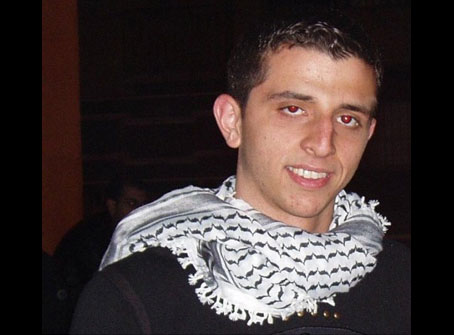

PRESS RELEASE
27 March 2012
Adalah Appeals District Court Decision Banning Palestinian Prisoner Rawi Sultany from Higher Education
District Court: Barring 'Security Prisoners' from Higher Education Studies is Part of "Discouraging Terrorism" / Adalah: "This decision is arbitrary. It is a part of a vicious campaign waged by the Israel Prison Service against Palestinian political prisoners."

Rawi Sultany
(Haifa, Israel) Adalah filed a request for permission to appeal the decision of the Nazareth District Court to the Israeli Supreme Court on 26 March 2012. Earlier this month, the District Court rejected the request of Rawi Sultany, a Palestinian citizen of Israel classified as a "security prisoner", to continue his higher education in the Open University after two years of study via correspondence. In June 2011, the Israel Prison Service (IPS) suddenly and arbitrarily decided to stop all Palestinian political prisoners from studying higher education courses.
According to the District Court, preventing prisoners from studying is part of "discouraging terrorism," and therefore this policy is in the public interest. The court based its decision on testimony from the General Security Services (GSS or Shin Bet or Shabak) that "terrorist organizations" reward prisoners by funding higher education in various indirect ways. The court added that prisoners and "terrorist organizations" take advantage of the privileges granted by IPS for security prisoners in order to pass information in and out of prisons.
Adalah Attorney Rima Ayoub argued in the request to appeal that the District Court's decision ignored Mr. Sultany's constitutional right to education, derived from the Basic Law: Human Dignity and Liberty, and ignored that the distinction between security and criminal prisoners is illegal in access to education. Moreover, as the District Court made its decision based on sweeping generalizations relying on secret evidence, namely organizations reward prisoners by funding education. The District Court disregarded the Supreme Court's mandate, Adalah argued, that secret evidence must be specific to the individual and prove the prisoner's specific connection to that evidence in order to be used in rulings. Attorney Ayoub added, "This decision is arbitrary. It is a part of a vicious campaign waged by the Israel Prison Service against Palestinian political prisoners."
Adalah filed the petition on behalf of Mr. Sultany in September 2011. Mr. Sultany began his studies in prison after being convicted in 2009 for contact with a foreign agent. The Open University is the only academic institution in which prisoners may enroll. Preventing them from joining its classes makes any chance of higher education impossible.
In the petition, Adalah stressed that the IPS's prohibition does not relate to prison safety, order, or internal security. Mr. Sultany's continued education does not have any effect on physical safety, but is instead a further way for prison authorities to punish him. Adalah emphasized that according to Israeli Supreme Court precedent, an individual's rights are preserved even following imprisonment. Imprisonment is not supposed to be supplemented by additional punishment. Any additional encroachment on a prisoner's rights should be built on a clear legal basis and conform with the Basic Law: Human Dignity and Liberty. Prisoners' basic and constitutional rights do not end upon entering prison, but on the contrary, must be heavily protected because of the prison authorities' absolute control.
For additional information, see: Press Release, "Adalah to District Court: Order IPS to Allow "Security Prisoners" to Complete their Academic Education," 8 September 2011